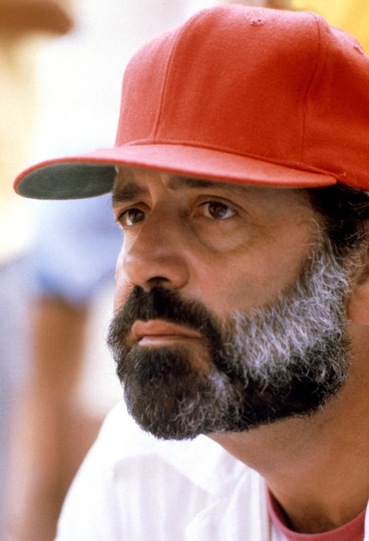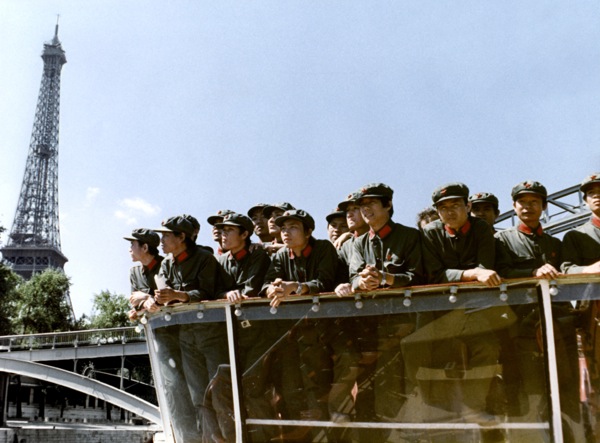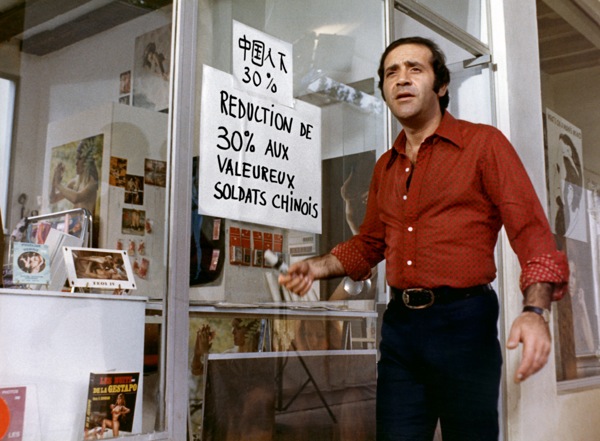It's all gone to hell,
Mister President
PostED ON 28.09.2015 AT 11:45AM
SELECTED MOMENTS OF JEAN YANNE - Cinema history will undoubtedly remember him as an actor, but France most surely as an entertainer. Jean Yanne was an excellent actor when under the direction of Godard (Weekend), Chabrol (This Man Must Die, The Butcher), Pialat (We Won't Grow Old Together), Audiard (See How They Fall), among others. But it is the somewhat sad clown of his own films that made their mark on audiences.
Four million tickets were sold for Everybody He is Nice, Everybody He is Beautiful. For his first film as a director, screenwriter (with Gérard Sire) and dialog writer, Jean Yanne brought the house down in 1972. Then, for ten years, feature films with definitive titles followed: Me, I Want to Have Dough (1973), Chinese in Paris (1974), Chobizenesse (1975), I've Got You, You've Got Me by the Chin Hairs (1978) and Quarter to Two Before Jesus Christ (1982) had France in stitches. The last movie a made the country laugh a little less: Liberté, égalité, choucroute (Litt. Liberty, Equality, Sauerkraut, 1984) was a resounding commercial failure and ended his directorial career.
A decade, though, during which the humor of the former journalist turned cabaret artist hit the bull's-eye. After all, he was reflecting the state of the country of the time: fleeting hopes of revolution, the growing oil crisis, the onset of unemployment, the short-lived "life changing" Socialism… The France of Louis de Funes, which had laughed heartily and with optimism, was becoming more apprehensive.
And Jean Yanne alleviated those worries. From film to film, he drew on almost everything with his disenchanted, even cynical, characters: "Laughter and anger are one and the same. The only difference is your approach to the subject," he said. And his "right-wing anarchist" sarcasm - a stance that always suited him well in France - helped relieve the disillusioned French.
Although his films were not model examples of directing, they linger in the French memory for some key lines of dialog, many of which have become classic references. Here is a concise thematic anthology:
On Politics:
In the film Chinese in Paris, when the Asians invade the capital, the chief of staff of the President (B. Blier) gives him the speech to deliver to the nation:
"-So, what shall I tell them?
-Uh, well… that it's all gone to hell, Mister President…
-Well, all right, but how should I tell them?
-As usual. 'My fellow citizens of France, the situation is serious, but not hopeless. Once again, France must deal with events that require a spirit of selflessness of its people.'"
When the speech is over, the President rushes off to catch a plane to America.

In Quarter to Two Before Jesus Christ, the consular Demetrius (Michel Auclair) addresses the raucous crowd:
"I understand you! Fellow citizens - you want lower taxes, employment for all, and no more inflation?"
The crowd shouts its approval. The consular continues:
"-We cannot do anything right now... But as soon as we can, we'll do the double!"
On the French:
In Chinese in Paris, The joint chief of staff from Beijing requests a dossier on the French, established by the Chinese secret service… who are holding the information they obtained from the Soviet services… who themselves squeezed it out of the Americans:
"The findings are always the same: the French are the biggest slackers in the world..."
Régis Forneret (Jean Yanne) shamelessly boosts his business thanks to the Chinese forces. "It's not every day we have an occupying army around. You have to know how to take advantage of it..."

When he meets the High Commissioner of China, he offers his advice:
"If I may, Your Excellency (...) I know the soul of the French well. See, I've been selling it for quite some time now, so..."
The High Commissioner of China sees postal bags piling up in front of his headquarters:
"-What is that all this mail?
- Denunciations, Comrade General..."
France finally frees itself from the Chinese occupation through debauchery and lust. The High Commissioner calls on the Beijing chief of staff to surrender:
"It's no longer possible, you understand... From centuries ago, it's all the French do: drink, screw and eat. No civilized being could bear a quarter of it. The group is exhausted, our brains are cracked and our nerves are shot... "
On Women:
In Quarter to Two Before Jesus Christ, the Roman consul (Michel Auclair) is annoyed at his wife (Françoise Fabian) who asks him to throw the dressmaker to the lions for making a blunder of her dress:
"Oh, Laetitia, this is getting ridiculous! Two weeks ago, I fed the plumber to the lions, last Sunday, the hairdresser was crucified, and now it's the dressmaker we need to throw into the arena! I do want to make you happy, but it will eventually make me unpopular..."
While Cleopatra cannot be found, the consul attacks the chief of police, who is ignorant of her whereabouts, but admits that, at dawn, he stopped and questioned a woman with a monkey and two hawks:
"But he doesn't get it! Everyone knows that Cleopatra is missing. He sees a woman and can't tell the damn difference between a queen of Egypt with a monkey and two hawks and a suburban whore! "
On the Media:
In Everybody He is Nice, Everybody He is Beautiful, the wife of the radio director where Christian Gerber (Jean Yanne) works, is looking for her husband. She is beside herself:
"Where is that piece of trash?
-Trash? What trash? You're in a radio station- trash is practically all we have here... "
The station, which seeks to please as many people as possible, decides to give maximum airtime to religion. Christian Gerber, back from covering a story, discovers the new editorial line and calls the Director (Jacques François):
"-What do you think you're doing?? We got closer to women, closer to the young, closer to nature, closer to couples, closer to sex and now closer to God?
-Closer to God, yes Gerber... You have to change with the times, Gerber... "
In Chinese in Paris, Gregory Montclair (Michel Serrault) plans to collaborate before joining a late resistance movement and criticizes Régis Forneret (Jean Yanne) for his behavior:
"All your life you've done nothing but shameful tasks: journalism, advertising, porn movies, public relations..."
When Rouget presents his first version of The Marseillaise in the Jeu de Paume hall, singing to an Offenbach tune, Mirabeau (Gérard Darmon) laments:
"No, but that's lousy crap! You'd better stick to advertising... "
P.S.

